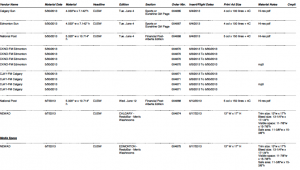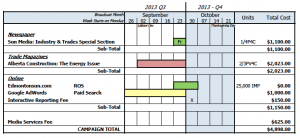What Does a Media Planner / Buyer Do?
As a marketing consultant, one of the most frequent questions I often get is, “What kind of marketing really works?” to which I, of course, will have to respond, “That depends on what kind of business you have, and who you are trying to target.” And further, the amount of budget you have to spend and where you are in your business life cycle are also relevant questions.
When you’re in business school, marketing seems like the easy subject – it’s often taught in a “What are the 4 P’s?” kind of way, and then you have to figure out some ads or a marketing plan for a given case study. But when you get out in the real world marketing a business, you realize that marketing possibilities are infinite – and you must figure out which ones will work best for you.
This is where media buyers and planners really earn their keep!
Media Planners Consolidate Advertising Data & Plan the Buy
Think of all those salespeople who sell ads for newspapers, radio, direct mail companies, television stations, trade magazines, trade shows, billboard companies, bathroom stall advertising, and online channels like Google, Bing, Yahoo, Monster, Autotrader, Daily Oil Bulleting and the list goes on. Somebody has to know how to take a client’s budget and figure out exactly which channels will give the biggest bang for the buck in reaching the clients desired target market. This is the media planner/buyer’s job.
Now think about what that job involves. Chatting to, and getting the pitch, from a lot of salespeople? Check! Taking the media’s pricing, demographic data, geographic data, ad sizing/specifications, deadlines, and consolidating it into data that can be quickly accessed for decision-making? Check! And there’s perhaps one other area: Media buyers can often check on what your competitors are buying in the market, and recommend what you need to budget to get a reasonable “share of voice” to achieve the “share of market” you’re aiming for. All of these things must be measured and budgeted, and selected for timing, ad size/placement, frequency, and the best visibility to your targets – and built into a carefully timed campaign budget, i.e. the media plan.
Media Buyers Manage the Ad Campaign Buy
Once a detailed media plan is done, there is much more work to be done. Need someone to take your “creative assets” – such as graphic designed files, sound files, video files, etc. and delivering them to the chosen media? Check! And how about this: Do you want to ensure that when the ads run, the radio stations, newspapers, websites, etc. actually ran them when and where they said they would, in other words, verifying that your money was legitimately used? Big check!
The Difference between Media Planners and Buyers
Most firms do both media planning and buying. However, most of the tasks I mentioned above describe the planning.
Once the client approves the budget and plan, they go into “buying” mode, or hand the job off to the buyer. The buyer then negotiates rates with the media and contracts the space. There is always a written authorization for media buyers to book space on behalf of the client, guaranteeing that the client will pay for the space.
Why Media Buyers & Planners are Important
Media Planners & Buyers work to make sure the rates across the board are the best they can be, negotiating on the client’s behalf, and picking up “bonus” time and space as they go. Because media buyers often work on behalf of many clients, they are able to act like a “buying group” – usually getting better rates because they know what the market will bear.
Today’s media planner/buyers also have another very crucial role benefit the marketing strategy process. Because they use sophisticated industry tools to track advertising activity, they can build in ways to monitor and track which ads are most effective throughout the process. For example, by working with a marketing strategist to create separate landing pages for various ads, and multiple versions of creative ads, they can see which ads are pulling better results, and optimize the campaign as it it running. This means you can get the best bang for your budget, and dramatically improve your campaign’s results mid-flight, especially if the media buyers are doing their job and really monitoring the campaign closely.
What Media Buyers & Planners do NOT do
Before you go running to a Media Buyer, keep this in mind: Media Buyers are NOT creative service people and usually only provide strategy only on the advertising channel recommendations. This means they expect that you will come to them knowing clearly
- Who your target markets are – demographics, geography and industries/decision maker level (if business to business)
- What budget you have in mind to spend (and/or which competitor-spending you might be trying to match/reach)
- What your creative (artwork) will be conceptually – and you will have to have it ready to be adapted to whatever media they choose for you (i.e. radio, print, outdoor).
- What your goals are — how much growth do you expect to achieve
- Which website (or phone numbers, or physical location) you’ll be driving traffic to, and possibly access to your webmaster to add tracking codes to landing pages, etc.
How are Media Buyers and Planners Paid?
Advertising space is sometimes directly paid, and sometimes the media buyer acts as an agent and has a commission (usually 15% at least) on the buy. Media Planning is often a separate professional fee on top of this bill. There can also be ongoing service fees throughout the campaign to manage it and track its results.
So Which Advertising Channels Work?
A media buyer once said to me that he thought that the creative/message made up 90% of the success of a given ad, and choosing the right channel is only 10%. He also said, “There are no bad advertising channels.” I don’t necessarily agree (because I would never recommend fax blasts and any kind of spam, and I do think choosing media is critical), but I agree in principle that the message is sometimes overlooked in favour of the channel. If the ad is strong, and really is memorable, someone will likely see it and act on it. If the ad is weak/boring, but plastered everywhere, you have probably had a lot more wasted budget. If you can get the strategy/message right AND you get the right channels too, then you have marketing dynamite. If you want to read more about building a promotional mix (i.e. selecting which channels for your marketing business), CLICK HERE.
The upshot is, the media buyer/planner is a very critical part of a good marketing strategy team, and can make all the difference in maximizing your marketing budget. At Tenato, we have an excellent, longstanding strategic alliance with True Media, a team of professionals that has proven their weight in gold time and time again. Give us a call if you’d like to learn more about how we can help you.



